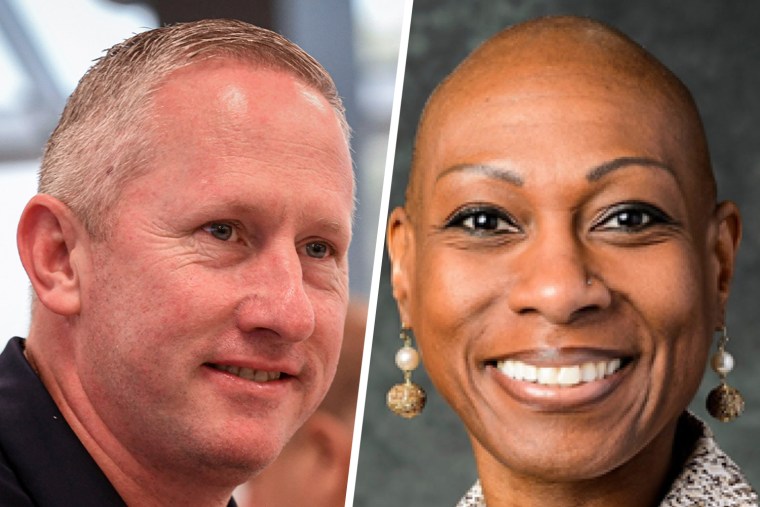The president of Lincoln University in Missouri will remain in his position, the institution decided after an investigation into the suicide of a Black administrator found no evidence that he had bullied her, according to university officials.
President John Moseley was placed on paid leave after the death in January of Antoinette “Bonnie” Candia-Bailey, the vice president of student affairs at Lincoln, a historically Black university.
“For us, this report is not the end of a process, but rather the beginning of one,” Victor Pasley, president of the university’s Board of Curators, said Thursday in a statement.
“None of its findings have led the Board to doubt President Moseley’s ability to lead the University, but this tragedy has forced us to grapple more fully with issues facing Lincoln and our individual students and employees — ranging from mental health support to employee work and relationships.”
Candia-Bailey, 49, died by suicide in Illinois on Jan. 8. Her mother, Veronica Candia, and husband, Anthony Bailey, previously told NBC News that Moseley had fired her in the days before her death. Bailey also said her daughter had been feeling depressed and unsupported at work. She said Candia-Bailey told her family that her relationship with Moseley had soured.
Candia-Bailey’s longtime friend Monica Graham said she received an email from Candia-Bailey the day she died that included a letter addressed to Moseley. In the letter, Candia-Bailey expressed concerns about Moseley’s leadership and the school administration, and wrote that Moseley had “intentionally harassed and bullied” her. The allegations prompted protests from students and alumni, calling for Moseley’s ouster.
Graham said she last saw Candia-Bailey in October at the university’s homecoming celebration. “She said this job isn’t going to kill me and this job depresses me,” Graham said.
Neither Graham nor Candia or Bailey initially responded to a request for comment from NBC News on the release of the university’s report.
After Candia-Bailey’s death, students marched and showed up outside a closed Board of Curators’ meeting to demand accountability. Moseley was placed on paid leave while a third party reviewed both the school’s handling of personnel issues and Candia-Bailey’s allegations, the board said in January.
In its statement, the Board of Curators said investigators looked at text messages, emails and other correspondence, and interviewed two dozen employees and leaders to determine whether Moseley had bullied Candia-Bailey.
“Dr. Candia-Bailey’s claims that she was bullied by President Moseley were unsubstantiated. Specifically, when directly asked in the course of this investigation, no witnesses reported that they had ever witnessed President Moseley engage in bullying — and all denied having ever personally felt bullied by President Moseley,” the board said in its statement.
The investigators also determined that the university had not failed to accommodate Candia-Bailey’s mental health needs under the Americans with Disabilities Act, and noted that she was not eligible for the leave she requested because she had been at the university for less than a year. The “University responded appropriately to requests for accommodation by, among other things, allowing remote work and the use of accrued leave,” the statement reads.
Following Candia-Bailey’s death, social media users and leaders in higher education flooded the internet with messages of support for her and her family. Sherman Bonds, the president of the university’s national alumni association, was among those who supported Candia-Bailey and called for Moseley’s ouster, telling NBC News, “We need new leadership and obviously to heal.”
Bonds did not immediately respond to a request for comment on the university report.
Candia-Bailey’s mother marveled at the outpouring of support for her daughter in the weeks after her death.
“I was not aware that there were so many people who thought so highly about my daughter,” she said. “I’d just like for her to be remembered as an inspiration to others.”
Moseley could not immediately be reached for comment, but, in a comment included in the board’s statement, he said his “thoughts and prayers have been and continue to be with Dr. Bailey’s family, friends, and our campus community.”
“The Board advised me of the report’s findings a week ago, and I’ve had time to reflect and to discuss my future and that of the University with my family and members of the Lincoln University community,” Moseley continued. “I care deeply for this University, its mission, our students, staff and faculty and I look forward to returning from administrative leave to resume my duties as President.”
For more from NBC BLK, sign up for our weekly newsletter.

